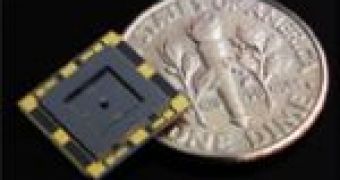Physicians will soon have at their disposal a portable device able to detect different forms of cancer and other diseases caused by bacteria.
Newcastle University researchers have come up with the idea of using a tiny disc, smaller than a dust speckle, whose surface is coated with special patterns of DNA or proteins which cause the cancer-specific markers to bind to the surface.
The discs are made to vibrate electronically in two modes. When a cancer-specific marker binds to the surface of a disc, in the pattern of the coating, the uneven weight causes one of the modes of vibration to change in frequency.
The difference between the frequencies of the two modes of vibration is measured, enabling the detection of tiny amounts of cancer specific marker. In theory, even the weight of a single molecule binding to the surface of a disc could be detected.
"We are confident that this new technology has the potential to improve the prospects of successful treatment for these cancers," Professor Calum McNeil, leader of the project said
"Early diagnosis and effective monitoring of cancers are known to be key factors influencing outcome. In addition, the technology could provide specialists with advice about the most appropriate therapy for a particular patient, since the devices could easily be connected to sources of information such as a hospital computer network, the internet or a mobile phone," he added
The idea of vibrating discs was inspired by earlier work at the University involving the manufacture of micro-gyroscopes, which are now standard equipment in many devices that detect movement, from navigation equipment to car air-bags.
At the heart of a micro-gyroscope is a vibrating disc that must be almost perfectly formed to operate correctly. Professor McNeil realized that a near-perfect disc could be turned into an extremely sensitive weighing machine.

 14 DAY TRIAL //
14 DAY TRIAL //